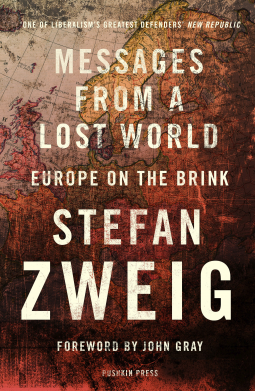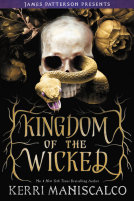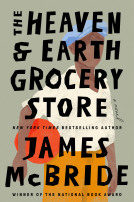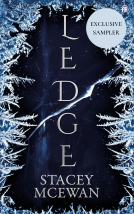
Messages from a Lost World
Europe on the Brink
by Stefan Zweig
This title was previously available on NetGalley and is now archived.
Send NetGalley books directly to your Kindle or Kindle app
1
To read on a Kindle or Kindle app, please add kindle@netgalley.com as an approved email address to receive files in your Amazon account. Click here for step-by-step instructions.
2
Also find your Kindle email address within your Amazon account, and enter it here.
Pub Date Apr 18 2017 | Archive Date Jan 13 2017
Description
These essays form the natural accompaniment to Zweig's renowned memoir The World of Yesterday, registering the same themes and evoking the same nostalgia for a world brutally consigned to history. They can be seen as a vital addendum to that major work or as a prefiguration. But perhaps even more so than the prose of the memoir, these essays, few in number but rich in content, reveal the essence of Zweig's thought.
Advance Praise
"One of liberalism's greatest defenders." — New Republic
"Zweig's impassioned pursuit of personal freedom seems more relevant than ever." — Newsweek
"These essays, few in number but rich in content, reveal the essence of Zweig's thought... Messages from a Lost World is ably translated from German into English for an American readership by Will Stone, making it an extraordinary and highly recommended addition to community and academic library collections. Messages from a Lost World is a lasting legacy for a new generation of readers from this memorable philosophy and dedicated historian." — Midwest Book Review
"The earliest pieces in Messages From a Lost World contain Zweig’s musings on the spiritual impact of the war, written while it was still in progress and with no end in sight. They are the thoughts of a man trying to find his way out of what must have seemed a completely reasonable state of despair. . . In pieces from the 1920s and early ’30s, Zweig takes it as a moral imperative to champion the cause of peace by reminding his readers and listeners that humanity could no longer afford the sort of belligerent nationalism that had led them into the Great War." — Inside Higher Ed
"Pushkin Press leads the Zweig revival: in the past ten years it has published thirty of his books, the latest of which is Messages from a Lost World, a collection of essays and speeches translated by Will Stone. Ranging from 1914 to 1941, they survey the conflict in Europe between civilization and barbarism. . . While it is disheartening to read these pieces today, knowing how Zweig’s life ended, it is inspiring to see that they have been published. However defeated Zweig might appear to contemporary readers, however aloof or naïve, his idea of the European soul is still worth defending." — Northwest Review of Books
"Zweig’s works are filled with a profound appreciation not only for his native Austria, but for Italy and France, and for their shared contributions to what he labeled the “magnificent common edifice” of European culture. Zweig’s essays, including several translated into English for the first time in Messages from a Lost World, amount to songs of progress, bursting as they are with pride and fraternity." — Rain Taxi Review of Books
"The earliest pieces in Messages From a Lost World contain Zweig’s musings on the spiritual impact of the war, written while it was still in progress and with no end in sight. They are the thoughts of a man trying to find his way out of what must have seemed a completely reasonable state of despair... In pieces from the 1920s and early ’30s, Zweig takes it as a moral imperative to champion the cause of peace by reminding his readers and listeners that humanity could no longer afford the sort of belligerent nationalism that had led them into the Great War." — Education News
Available Editions
| EDITION | Other Format |
| ISBN | 9781782272298 |
| PRICE | $15.95 (USD) |
| PAGES | 224 |
Featured Reviews
 Educator 211653
Educator 211653
Thank you Net galley. A very interesting read from a writer whose life was marred by personal despair. The essays describing the Europe of WWI to WWII are well written and strike a chord with the problems besetting contemporary Europe and the world beyond it. Highly recommended.
 The Idle Woman ., Reviewer
The Idle Woman ., Reviewer
Everyone has been talking about echo chambers recently. Those of us cosily insulated in our liberal-metropolitan-elite ivory towers, with our European friends and our Guardian diet, have had quite a wake-up call this year. We were lulled by our Facebook and Twitter feeds, which reflected back our own views ad infinitum, until it seemed inconceivable that anyone else could think differently. Now we find ourselves in a situation where we have to justify or, worse, defend our longing for a community greater than ourselves. In light of all this, Pushkin Press’s publication of Stefan Zweig’s essays is nothing short of inspired. Written a hundred years ago, these short pieces are charged with the despair of a generation which weathered two cataclysmic wars. They are terrifyingly relevant today. Simple, powerful and unapologetically intelligent, they’re absolutely vital reading as we wait in the shadow of Brexit. Unfortunately those who most need to read them are precisely those who won’t.
This is an important book because it explains the world in which the EU was founded and the reasons for doing so. It’s a call for understanding and tolerance, and a deeply sobering picture of what happens when such calls go unanswered. Zweig may have been too much of an idealist, but he is an excellent and accessible writer. He doesn’t offer any flimsy easy routes to solve the European problem, but his writing shows why it’s important that we don’t allow Brexit to stunt our cultural engagement with Europe, even if we relinquish our political involvement. I feel we’ve already made great progress since Zweig’s day and now, as we find ourselves in newly uncertain times, it’s our turn to keep the flame burning.
For the full review, please visit my blog on the link given below:
https://theidlewoman.net/2016/12/17/messages-from-a-lost-world-stefan-zweig/







